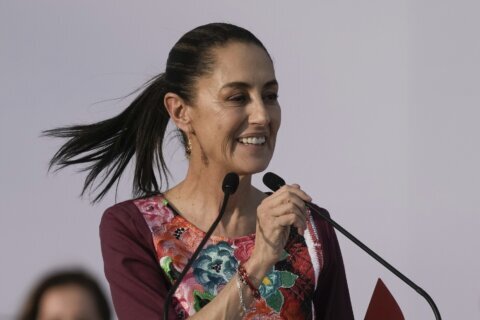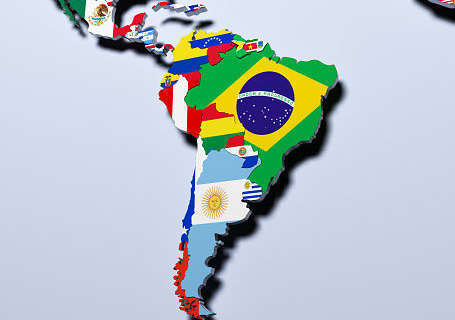PANAMA CITY (AP) — One Monday in June in an upscale neighborhood of Panama City, people noticed something odd: Strange cars were coming and going from the Coco del Mar Suites, a nondescript three-story residential building surrounded by luxury oceanside high-rises.
It wasn’t long before the newspaper La Prensa cleared up the mystery. In a second-floor apartment that was recently spruced up with a new coat of paint and had air conditioning and electrical work done, someone was running a clandestine COVID-19 inoculation site purportedly offering the Pfizer-BioNTech vaccine.
Investigators soon linked it to yet another scheme of underground injections a week earlier, this one on the 43rd floor of a residential skyscraper in the even wealthier coastal neighborhood of Punta Pacifica.
Authorities have only confirmed 32 people received shots between the two operations, but it nevertheless sparked outrage in Panama, where the government is supposed to be the only supplier of coronavirus vaccines, free and prioritized by age and risk level. These recipients were perceived as trying to use their privilege to cut in line even as the country sees a new rise in infections.
“Around here they are people with money,” said Jacinto Ortega, who was in Punta Pacifica on a recent day to deliver groceries, “and they must have some connection with somebody to get vaccinated.”
According to the investigation, the first clandestine injection clinic took place June 1 at the home of a woman identified as Celine Gazal de Esses. Fifteen people got shots there including Gazal, her son and some employees and friends, according to the investigation overseen by chief prosecutor Javier Caraballo. Gazal’s lawyer said she had already been vaccinated in the United States.
Denisse Vega, the owner of the Coco del Mar Suites, is said to have gotten wind of it and contacted Gazal to find out how to get in touch with the people offering vaccines.
On June 7 she could be seen peering from the third-story windows as people arrived outside. La Prensa said some came in luxury cars, others in run-of-the-mill sedans. Seventeen people got shots that day including, investigators say, some employees from two pharmaceutical labs where Vega worked as manager. It’s not clear whether money changed hands.
Both locations were later raided by authorities, but neither Gazal nor Vega has been arrested or charged with a crime.
So far the only arrest has been of Matías Pérez Escudero a 40-year-old funeral home driver who allegedly passed himself off as a doctor offering to inoculate people in house calls and administered the shots in both instances. He has been charged with fraud, making false statements and illegally practicing medicine. Pérez has not made public comments, and it was not known whether he had a lawyer.
Caraballo said authorities were also seeking a possible accomplice.
Of concern is that it’s not yet known whether it was actually coronavirus vaccines being injected into the recipients’ arms, or some other substance. Authorities have asked the 32 people who got the shots to undergo lab testing to find out.
Caraballo said Vega had handed out vaccination certificates to those who got the shots, but they were different from those being distributed by the official program. And the Pfizer lot numbers they carried don’t match any received by Panama, where, like most countries, the government is the only importer.
Ezra Ángel, an attorney for Gazal, said those at her home were the victims of “a scam by an isolated subject” and they believe they were injected with saline solution.
A lawyer for Vega, Abilio Batista, has said in public remarks that “everything is being duly cleared up.” Vega was fired, and the labs where she once worked have sought to distance themselves from her actions.
Authorities have not named publicly those who got shots. An attorney for one of them, Alfredo Vallarino, told Panamanian media that they learned about it via WhatsApp, where they were asked to turn up in groups of 12 and pay $200 to be inoculated.
Top officials are promising to get to the bottom of the matter.
“We will energetically pursue and punish those who committed this crime,” Health Minister Luis Francisco Sucre said.
“I want to say loud and clear to the country, there is no room for playing around with lives and health,” President Laurentino Cortizo said. “Vaccines in Panama are being administered by (the government), and they’re not for sale.”
Nevertheless, the scandal has shaken Panama’s health care sector.
“Credibility is in the balance,” infectious disease expert Xavier Sáenz-Llorens said. “There have been several irregularities, while people who are really at risk and are on the waiting list remain unprotected.”
Faustina Díaz Quirós, the president of two associations representing patients with critical and chronic conditions, condemned those involved: “The game of ‘I have money and I can do what I want to’ is not correct, is reprehensible, and there definitely must be punishment.”
Panama has administered some 1.4 million doses, enough to fully vaccinate about 17% of its population of 4.2 million. The nation has recorded about 400,000 confirmed cases and almost 6,500 deaths.
Other countries in Latin America have been hit by scandals over vaccine access.
Argentina’s health minister and coronavirus czar resigned in February after a well-known journalist said he had been given a coronavirus vaccination preferentially after asking the official for one. There were also reports of lawmakers, mayors and others close to power getting shots ahead of prioritized groups such as health personnel and older people.
And in Peru the president announced that same month that nearly 500 officials, including former ministers of foreign affairs and health, took advantage of their positions to secretly receive early injections of a Chinese vaccine the government bought for front-line health workers.
In Panama, where inequality is highlighted in the contrast between gleaming high-rise residences and squalid slums, the scandal was all too familiar for many.
“Some people are privileged. There’s always somebody looking to take advantage,” said Eva Pérez, 40, who runs a nutrition clinic in a low-income neighborhood of the capital. “That’s the way Panama is.”
Copyright © 2024 The Associated Press. All rights reserved. This material may not be published, broadcast, written or redistributed.







